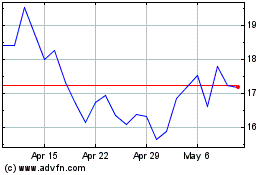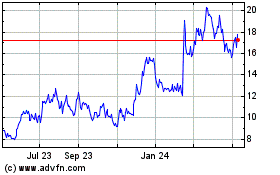Lyft to Suspend Service in California -- 2nd Update
August 20 2020 - 2:27PM
Dow Jones News
By Preetika Rana
Lyft Inc. said Thursday it will suspend operations in California
as of midnight on Friday, to avoid violating an order that requires
it to immediately reclassify its drivers as employees.
A state judge last week gave Lyft and Uber Technologies Inc.
until Friday to reclassify their drivers as employees, after
California sued the companies alleging they were violating a state
law that took effect on Jan. 1. The companies are appealing the
decision, but are required to comply unless a stay is granted
before the Friday deadline.
Uber spokesman Noah Edwardsen said the company also plans to
suspend operations if a stay isn't granted.
California's so-called gig-worker law requires companies to
treat workers as employees rather than independent contractors if
they are controlled by their employer and contribute to its usual
course of business, among other things. As employees, drivers would
be eligible for sick days and other benefits, issues that have
become more pressing during the coronavirus pandemic.
Uber and Lyft, both based in San Francisco, have argued that
they are technology platforms connecting riders with drivers, not
transportation companies, so the drivers aren't part of their usual
course of business.
Both companies argue that the reclassification would require
drivers to work prescheduled shifts, robbing them of the
flexibility they now enjoy. The companies say they would be forced
to consolidate their fleets, using fewer drivers who work more
hours a week; sharply reduce their footprints in the suburbs, where
demand is spotty; and raise prices for rides to offset the new
costs associated with recruiting, monitoring and managing driver
operations.
Suspending ride-share in California, which accounted for 9% of
Uber's rides world-wide and 16% of Lyft's before the pandemic,
would deal another blow to a business ravaged by the health crisis.
Uber reported a 75% year-over-year drop in rides in its second
quarter; Lyft's active riders fell by more than half over the same
period.
Complying with the order, though, would undermine the economics
of ride-hailing at a time the companies are struggling to turn a
profit. It could also set a precedent for legal battles playing out
elsewhere in the U.S. and around the world. Massachusetts is suing
Uber and Lyft over alleged driver misclassification, and Uber
drivers in Europe have filed legal complaints seeking broader
employment benefits.
Both companies have their sights on a November ballot
initiative, where voters in California can decide whether they want
to exempt them from the state law at the heart of the dispute.
Write to Preetika Rana at preetika.rana@wsj.com
(END) Dow Jones Newswires
August 20, 2020 14:12 ET (18:12 GMT)
Copyright (c) 2020 Dow Jones & Company, Inc.
Lyft (NASDAQ:LYFT)
Historical Stock Chart
From Mar 2024 to Apr 2024

Lyft (NASDAQ:LYFT)
Historical Stock Chart
From Apr 2023 to Apr 2024
